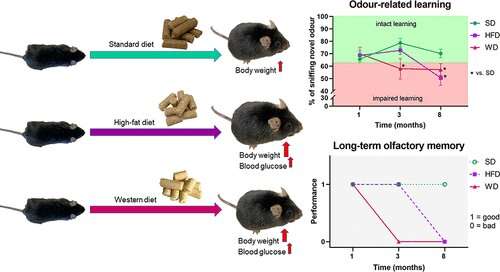
Problems with the sense of smell appear to be an early indicator of cognitive decline in people with type 2 diabetes. However, it’s unknown whether factors such as diet and obesity play a role in who develops these symptoms. Now, researchers reporting in ACS Chemical Neuroscience found that mice fed a moderate-fat, high-sugar chow (simulating a Western diet) showed a faster decline in their ability to learn and remember new odors.
Some people with type 2 diabetes (T2D) show signs of olfactory dysfunction, including problems with detecting, discriminating or recalling odors, or even a complete loss of smell. These symptoms are strongly associated with cognitive impairment, and evidence suggests they could be an early indicator of the condition in people with T2D. Obesity, which is the main risk factor for T2D, has also been associated with olfactory dysfunction, but the impact of obesity on the sense of smell specifically in these patients is unclear, as studies have produced conflicting results. Also, it’s unknown whether certain nutrients in the diet, such as fat and sugar, affect the sense of smell. To find out, Grazyna Lietzau, Cesare Patrone and colleagues wanted to compare the effects of two diets on different olfactory functions in mice: a high-fat, moderate-sugar diet (HFD); and a moderate-fat, high-sugar diet (similar to a Western diet, WD). In mice, both diets cause obesity and T2D-like features.
Source: Read Full Article
